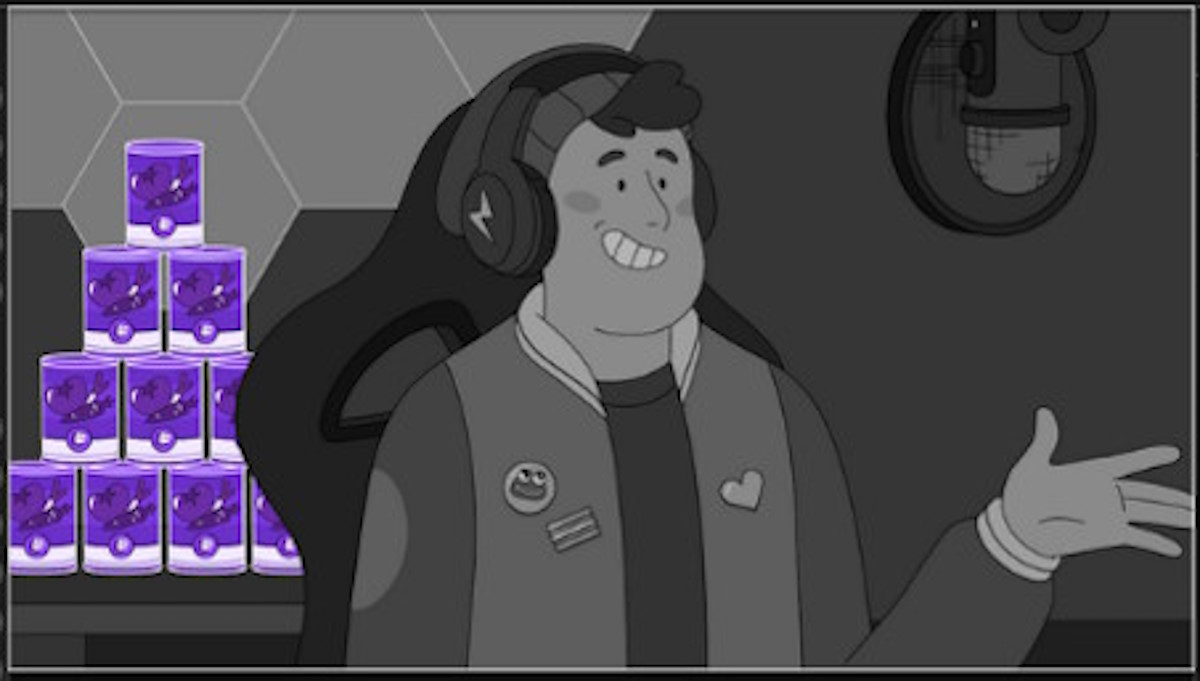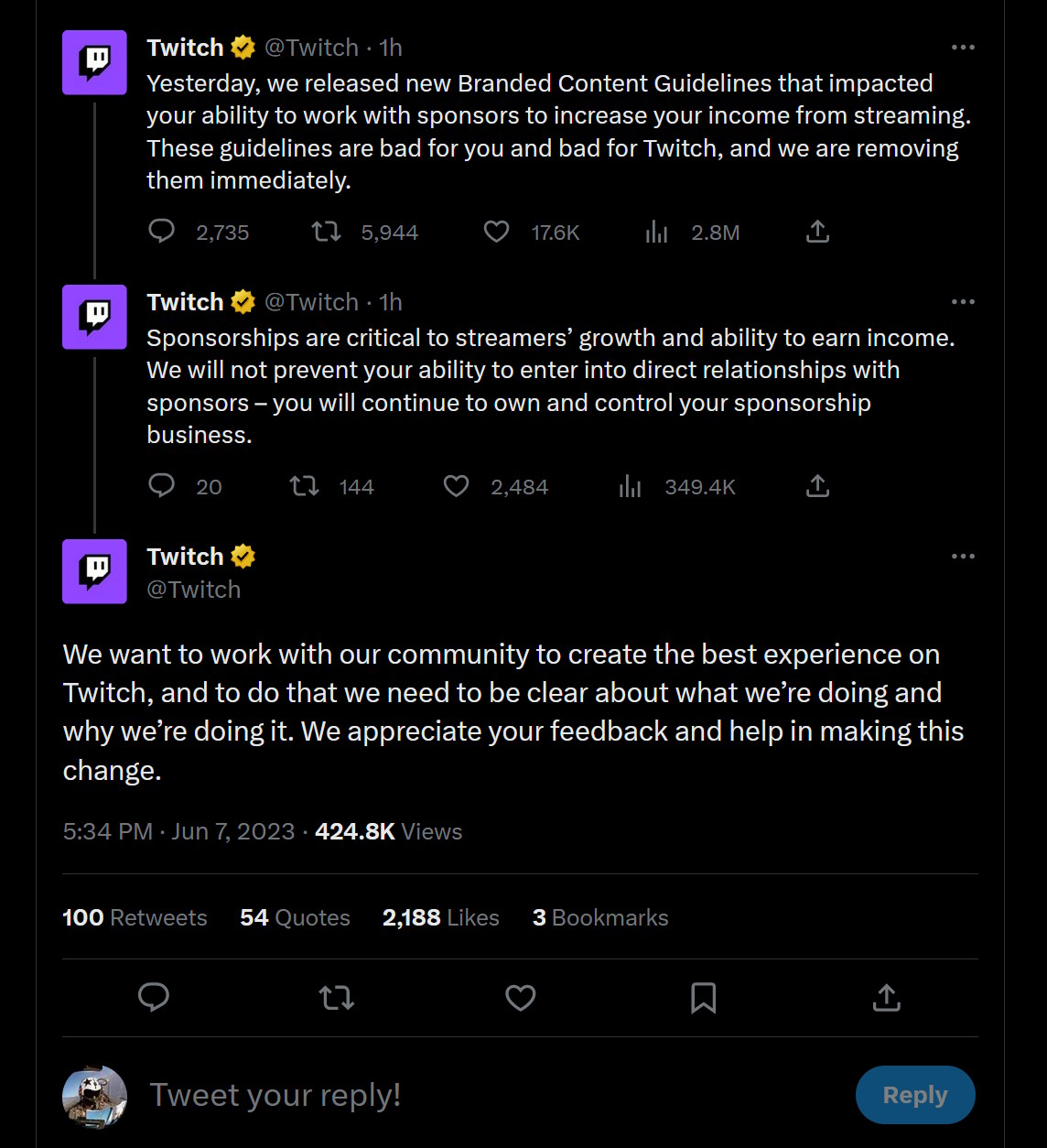Streamer outrage forces Twitch to drop planned changes to branded ad rules
Just one day after the new branded content policy was announced, Twitch has dropped the plan.

Keep up to date with the most important stories and the best deals, as picked by the PC Gamer team.
You are now subscribed
Your newsletter sign-up was successful
Want to add more newsletters?

Every Friday
GamesRadar+
Your weekly update on everything you could ever want to know about the games you already love, games we know you're going to love in the near future, and tales from the communities that surround them.

Every Thursday
GTA 6 O'clock
Our special GTA 6 newsletter, with breaking news, insider info, and rumor analysis from the award-winning GTA 6 O'clock experts.

Every Friday
Knowledge
From the creators of Edge: A weekly videogame industry newsletter with analysis from expert writers, guidance from professionals, and insight into what's on the horizon.

Every Thursday
The Setup
Hardware nerds unite, sign up to our free tech newsletter for a weekly digest of the hottest new tech, the latest gadgets on the test bench, and much more.

Every Wednesday
Switch 2 Spotlight
Sign up to our new Switch 2 newsletter, where we bring you the latest talking points on Nintendo's new console each week, bring you up to date on the news, and recommend what games to play.

Every Saturday
The Watchlist
Subscribe for a weekly digest of the movie and TV news that matters, direct to your inbox. From first-look trailers, interviews, reviews and explainers, we've got you covered.

Once a month
SFX
Get sneak previews, exclusive competitions and details of special events each month!
Just one day after announcing planned changes to its branded content guidelines which established tight limits on how streamers would be allowed to run ads on their channels, Twitch is dropping the whole thing, saying the updated guidelines "are bad for you and bad for Twitch."
Of course, it all started over money. "We recognize that streamers want to collaborate with brands, but as outlined in the Terms of Service we maintain the exclusive right to sell, serve, and display advertisements on the Twitch Services," Twitch said yesterday. "This means that you may not insert, embed, or 'burn in' prerecorded advertising units into your livestream."
Those planned changes did not go over well, with anyone. High-profile streamers demanded that the new guidelines be changed or dropped; at least one streaming network threatened to leave the platform entirely if the new rules were allowed to stand.
It was enough that, several hours later, Twitch acknowledged that it had "missed the mark with the policy language" and promised to update "the language" to make the situation clearer. But this too was met with criticism, as many streamers pointed out that the problem wasn't that the policy was unclear, but that it was bad.
Twitch apparently got the message: Restrictions on content, like alcohol, gambling, and adult content, remain, but the entire "prohibited formats" section has now been removed.
"Yesterday, we released new Branded Content Guidelines that impacted your ability to work with sponsors to increase your income from streaming," Twitch said. "These guidelines are bad for you and bad for Twitch, and we are removing them immediately.
"Sponsorships are critical to streamers' growth and ability to earn income. We will not prevent your ability to enter into direct relationships with sponsors – you will continue to own and control your sponsorship business. We want to work with our community to create the best experience on Twitch, and to do that we need to be clear about what we're doing and why we're doing it. We appreciate your feedback and help in making this change."
Keep up to date with the most important stories and the best deals, as picked by the PC Gamer team.
It's a good move—the only move, really, given the intensity of the blowback—and streamers are largely happy with the outcome. What they're not happy about, however, is what's widely seen as an ongoing series of missteps and mismanagement, a negative perception that's exacerbated by Twitch's ongoing refusal to provide its streamers with a better revenue cut—a sentiment succinctly made by, among others, the popular streamer Gothalion, who called on Twitter to "walk that one back too."
Some streamers have also noticed that Twitch's terms of service now carry limitations on allowed types of advertising that are very similar to what was prohibited yesterday. The section on "advertisements," for instance, states:
"Twitch has the exclusive right to monetize the Twitch Services, including without limitation, the exclusive right to sell, serve, and display advertisements on the Twitch Services. This means you may not, nor may you allow a third party to, insert or embed prerecorded advertising units into your live stream, including without limitation video advertisements (whether pre-, mid-, or post-roll); display or 'banner' advertisements; and audio advertisements."
That sounds not too far off of what was announced yesterday and then walked back today, and some streamers are accusing Twitch of simply moving the advertising restrictions to a less visible location. I've reached out to Twitch for comment and will update if I receive a reply.

Andy has been gaming on PCs from the very beginning, starting as a youngster with text adventures and primitive action games on a cassette-based TRS80. From there he graduated to the glory days of Sierra Online adventures and Microprose sims, ran a local BBS, learned how to build PCs, and developed a longstanding love of RPGs, immersive sims, and shooters. He began writing videogame news in 2007 for The Escapist and somehow managed to avoid getting fired until 2014, when he joined the storied ranks of PC Gamer. He covers all aspects of the industry, from new game announcements and patch notes to legal disputes, Twitch beefs, esports, and Henry Cavill. Lots of Henry Cavill.


